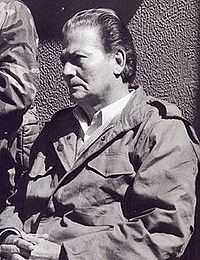Roberto Suárez Goméz
| Roberto Suárez Gómez | |
|---|---|
 | |
| Born |
1932 Trinidad, Bolivia |
| Died |
July 20, 2000 Santa Cruz, Bolivia |
| Other names | King of cocaine |
| Conviction(s) | Drug trafficking and smuggling |
Roberto Suárez Gómez, nicknamed "king of cocaine" (1932 – July 20, 2000) was a Bolivian drug trafficker who played a major role in the expansion of cocaine trafficking in Bolivia. He was descendent of the Suárez brothers "rubber barons", who had been responsible for the extermination of the Caripuña people on the Madeira River in Bolivia (Tully, p. 404).
In the mid-1970s he began to conduct business with the Colombian drug lord Pablo Escobar and after that he started to recruit Bolivian coca producers into his company "La Corporación" (the Corporation).[1][2]
He financed the military coup that installed a dictatorship in 1980, in which Luis García Meza would be president and Suarez's cousin Luis Arce Gómez was Minister of the Interior, and so he received political protection for his enterprise.[3] Arce Gómez ordered the killings of many Bolivians, including union leaders and intellectuals such as Marcelo Quiroga Santa Cruz. According to some sources, the CIA knew about the coup in advance (Straitfeild).
In a letter to Ronald Reagan in 1983 he offered to pay Bolivia's foreign debt of more than $3 billion if he and his son got amnesty.[2][4]
He was also under protection of the DEA through most of the eighties until his activities were too notorious. In 1988 he was arrested and sentenced to 15 years in the San Pedro prison for drug crimes, but he was released in 1996 during the government of Sánchez de Lozada. Four years later he died of a heart attack.[2][4]
See also
References
- ↑ "Suárez Gómez, Roberto". Encyclopædia Britannica Online. Retrieved 2008-12-29.
- ↑ 2.0 2.1 2.2 Lutteman, Markus (2007). El Choco : svensken i Bolivias mest ökända fängelse (in Swedish). Norstedts. pp. 118–120. ISBN 978-91-7263-878-5.
- ↑ http://www.britannica.com/EBchecked/topic/713761/Roberto-Suarez-Gomez
- ↑ 4.0 4.1 "Roberto Suarez Gomez; Bolivian Drug Trafficker". Los Angeles Times. July 24, 2000. Retrieved 2008-12-29.
Bibliography
- Tully, John. (2011). The Devil's Milk: A social History of Rubber. Monthly Review Press, New York.
- Dominic Straitfeild. (2001) Cocaine.